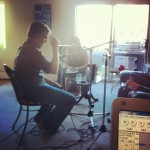Stage Managers are so vital to the success of a show. As many of you dear readers know, we have a little phrase we use to honour our regular Stage Manager, “No Joe, No Show!” And that literally came from the fact that without our talented and organized and discpilined SM, we wouldn’t have a show. But how do you know if you’ve got a good one or not? Or if the show you are watching had a good one? That can be tough, actually.
It’s tough because if the show has a really good SM, then it’s likely you wouldn’t give the job another thought. Many young actors shy away from the responsibility of SM, some for their knowledge of what the job entails, but many for their lack of knowledge of the importance of the role. If anyone ever wishes to direct, then I say, they must first Stage Manage.
A good SM is disciplined, organized and creative. They know how to put their bible of the show together and how to keep track of all the minutia of details that can make or break a rehearsal. An exceptional SM has their binder ready before first rehearsal with media release forms, health and safety forms, extra copies of first rehearsal schedules, contact lists and whatever else might be necessary to answer questions and keep everyone on track.
A good SM can keep the cast AND the crew in line – this includes the Director. So, and exceptional SM has the respect and admiration of the director. They can work well together and the SM knows that if they call a halt to rehearsal for whatever reason, the Director will understand that it was for the good of the show and not meant as a slight to anyone involved. An exceptional SM will be that moderator, note-taker and interpreter of the Director’s vision. Often Directors and Actors (and other creators as a matter of fact) will get caught up in their creation and what they are trying to say or do – so caught up in fact that they may need a translator. If your SM is really good and has been really paying attention, then they already know what you are trying to say even before you say it. And they help make it happen.
In the end, the show belongs to the Stage Manager. It won’t happen without them. No calls are given, no audience is admitted and no curtain goes up without them. You hand over the keys and they control the destiny of the show, so find a good one, nuture them – and while you’re at it… find another one, because the really good ones get snapped up fast!!!
Do you want that kind of responsibility and knowledge of a show??? Then get out there and join a production to learn what it takes to be a Stage Manager!



